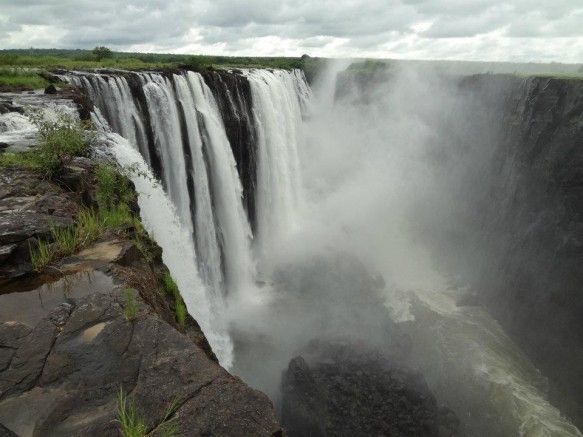No country is immune from corruption. However, there are some nations where corruption is tolerated and even considered a way of life....
The World Economic Forum estimates that on a yearly basis corruption adds up to 10 percent to the cost of doing business globally. This pain is more felt in developing nations, and those just recovering from decades of unrest, where corruption adds up an estimated 25 percent to the cost of procurement contracts.
These are the top 10 most corrupt countries in the world right now, according to the Maplecroft Corruption Risk Index.
10. Venezuela

Many would think the discovery of oil in this Latin American country in the earlier part of the twentieth century would have led to its prosperity. Instead it only heightened the struggle by the few political elite in that country to hold on to their power. The latest strongman who tried to perpetuate himself in power, Hugo Chavez, a self-styled socialist “revolutionary”, was thwarted when he tried to pass a law that would have allowed him unlimited opportunities to run for re-election. However, given as it is now one of his cronies in the presidential seat, one can only wonder if the country will move forward.
9. Cambodia

Corruption has reportedly pervaded almost all aspects of Cambodian life, from dealing with traffic violations, getting a motorcycle license, obtaining medical treatment and even to get a favorable court decision. Analysts say decades of civil war, political unrest and disorder have helped prop up a patronage system that people turn to when they want things done fast and efficiently. Cambodian society and government itself does not really encourage the public’s participation in the formulation of laws and policies, further deteriorating the situation. There are anti-corruption laws being proposed, it’s just that no one has the interest to enact them.
8. North Korea

Considering that it seems the entire country is meant to serve just one man, there should be little wonder why corruption is so prevalent in North Korea. Bribes to public officials are considered a commonplace, kickbacks in public procurement is part of the system, and embezzlement of public funds happens often. The fact that the government is leaving it to itself to police itself only worsens the situation. Refugees even have to bribe their way to freedom. Those who want to escape the country into China have to pay border guards to look the other way when they are crossing over the border.
7. Guinea

The cost of living in this impoverished country is rather high, although it has improved considerably since 2008. However, a recent mining scandal involving a former president and two multinational companies resulted in the loss of billions of pounds. Now the country wants it back. The people of Guinea themselves have called in help from the United States and the United Kingdom to investigate this case after it became too widespread and too big for them to handle.
6. Equatorial Guinea

This country in western Africa is actually very rich in natural resources like oil, minerals and natural gas. However only a few are becoming rich off the exploitation of these resources, leaving the poor, who make up most of the population to eke out their way in a country with inadequate sanitation, frequent blackouts and a crumbling education system. It is estimated that while few earn millions from marketing their resources, around 60 percent of Equatorial Guinea’s citizens live on less than $1 a day and have to spend much of it in bribes to make sure they get basic services.
5. Zimbabwe

Once a prosperous nation, Zimbabwe has fallen on hard times. So much so the currency is now issued million-figure bills due to hyperinflation. There has been little improvement. The government is still mistrustful of outside aid or interference and the people have to cope with a government that has no check and balance system. Their school system is one of the institutions most hit by corruption, with the few educated citizens demanding exorbitant bribes to take tests and submit papers on behalf of illiterate ones in the hope that they can graduate and be accepted for a job.
4. Sudan

Sudan is another country where decades of civil war, religious unrest and political turmoil have given rise to a patronage system people turn to ensure they get what they need. The situation is worsened by a government that barely keeps records of transaction and lacks transparency in general. Nepotism is also common, with high-ranking officials making sure to put relatives in other high positions to ensure their grip on power. Bribes are a must in dealing with the police. Even those who want to establish businesses in the country have to pay the right public officials to get a license.
3. Myanmar

Myanmar just had its freest elections after four decades of junta rule, but it still has a long way to go where the provision of basic services are concerned. The country is rich in lumber, oil and gas, however, only the ruling elite was able to enrich itself on these during the decades on junta rule. The system of offering bribes to get basic services is so institutionalized it has a name: “tea money”. Even foreign companies who want to invest in Myanmar are being introduced to the concept of tea money, especially when they negotiate for import/export licenses, land lease agreements and taxation.
2. Somalia

Just like Sudan, Somalia is another nation ravaged by war and where people turn to patronage to get what they need. The government sector most plagued by corruption in this country are the Armed Forces, which usually demand bribes from the people to do their job; Immigration which fleeces people leaving and entering the country, Customs which demands bribes for goods coming in and out; and the Telecommunications sector which has the biggest and most lucrative businesses. The government itself does not have anti-corruption laws and seldom keeps track of huge government expenditures. Sudanese officials are also known for their lavish “educational” trips outside the country.
1. Democratic Republic of Congo

While the DRC is now considerably stable years of infighting, there is still little progress and development. A sound legal structure is still not in place, the government itself does not publicly discuss how it decides to spend its budget, leaving many people sorely lacking what they really need and having to rely on grease money to make sure they can get it. The sectors that are most involved in corruption include the mining sector, forestry, tax and customs and even the state-run enterprises.
source

No comments:
Post a Comment